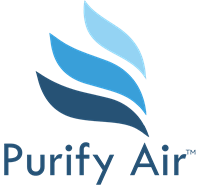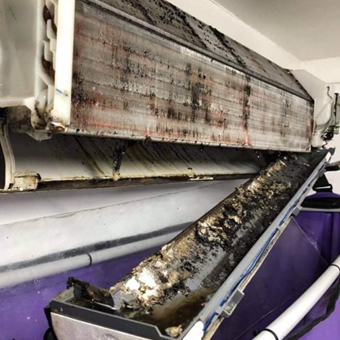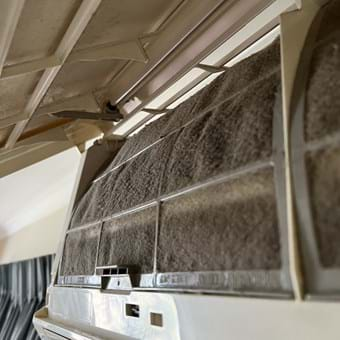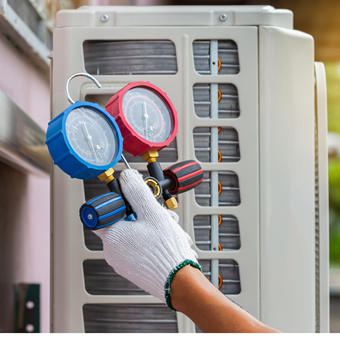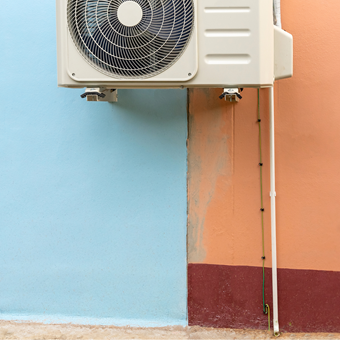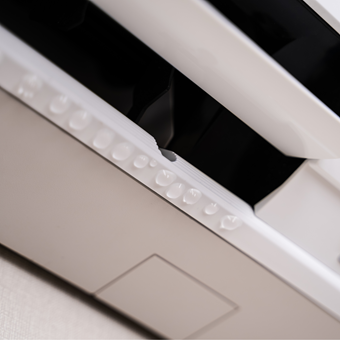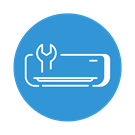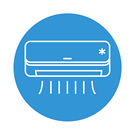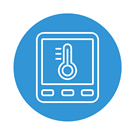8 Reasons Why Air Conditioners Leak, The Damage This Can Cause, and How To Prevent It
Air conditioners are a modern necessity, keeping homes and businesses cool and comfortable. However, they can develop leaks, leading to inconvenience, higher energy costs, and even property damage.
Understanding why air conditioners leak, the potential harm they can cause, and preventive measures is crucial for maintaining their efficiency and longevity.
In this Blog we explore the top reasons air conditioners leak, the associated risks, and how to address and prevent these issues.
Causes of Air Conditioner Water Leakage
CLOGGED DRAIN LINE
Cause:
One of the most common reasons air conditioners leak is a clogged drain line. Over time, dirt, dust, and debris can accumulate in the condensate drain line, blocking the flow of water and causing it to back up into the unit.
Damage:
If left unchecked, a clogged drain line can lead to water pooling around the air conditioner. This can damage flooring, ceilings, and walls, especially if the unit is located indoors or in an attic space. It may also promote mould and mildew growth, posing health risks.
Prevention:
Regularly inspect and clean the AC unit and the drain line. Use a wet/dry vacuum, flush with water or pressurised air to remove dirt, dust, insects and excrement (Gecko poo) that build up over time blocking or reducing the flow of condensation water.
DIRTY AIR FILTER
Cause:
A dirty air filter restricts airflow, causing the evaporator coil to freeze. When the coil eventually melts, excess water can overflow the drain pan and cause leaks.
Damage:
Prolonged water leakage can damage the surrounding structure and electrical components of the air conditioner. It can also reduce the unit’s efficiency, leading to higher energy bills.
Prevention:
Clean air filters every 1-3 months, depending on usage and manufacturer recommendations. Keeping the filters clean ensures proper airflow and prevents coil freezing and dirt and dust build up in the AC unit.
IMPROPER INSTALLATION
Cause:
An incorrectly installed air conditioner may have improper drainage, leading to water accumulation. This is particularly common in window units that are not level. Water does not flow uphill and will always find the easiest way out which is often out the front of the AC unit or down the wall.
Damage:
Poor installation can cause water to leak indoors, potentially damaging furniture, flooring, and other belongings.
Prevention:
Ensure the unit is installed by a professional. For window units, check that they are slightly tilted toward the outside to allow proper drainage.
CRACKED OR DAMAGED DRAIN PAN
Cause:
The drain pan or channel collects condensation from the evaporator coil. Over time, it can crack or rust, allowing water to escape.
Damage:
A damaged drain pan can lead to water dripping into areas it shouldn’t, causing structural damage and creating a breeding ground for mould.
Prevention:
Inspect the drain pan during regular maintenance. Also check the drainage hoses are in good condition and properly attached.
LOW REFRIGERANT LEVELS
Cause:
Low refrigerant levels cause the pressure in the system to drop, leading to coil freezing. When the ice melts, it can overwhelm the drainage system and result in leaks.
Damage:
Low refrigerant levels not only cause leaks but also strain the compressor, potentially leading to expensive repairs or replacements.
Prevention:
Schedule regular HVAC maintenance to monitor refrigerant levels and address any leaks in the system promptly.
FAULTY CONDENSATE PUMP
Cause:
In systems where the air conditioner is installed below ground level or on an internal wall without direct access to the outside. A condensate pump is used to move water upward and across the roof cavity for proper drainage outside. A malfunctioning or clogged-up pump can lead to water accumulation and leaks.
Damage:
Water can pool around the unit, damaging the flooring or nearby equipment and creating slip hazards.
Prevention:
Test the condensate pump regularly and clean or replace it if it shows signs of wear or failure.
FROZEN EVAPORATOR COILS
Cause:
Frozen evaporator coils result from poor airflow, low refrigerant levels, or extremely dirty coils. When the ice melts, the excess water can overflow the drain pan.
Damage:
The overflow can lead to water damage, and the root cause of the freezing may also decrease the unit’s lifespan if left unaddressed.
Prevention:
Maintain proper airflow by keeping filters clean and ensuring adequate refrigerant levels. Schedule regular professional inspections to clean the coils and address underlying issues.
EXCESS HUMIDITY
Cause:
In high-humidity environments, air conditioners may struggle to remove moisture efficiently. This can lead to an excess of condensation that overwhelms the drainage system.
Damage:
Excessive moisture can lead to water damage, mould growth, and reduced indoor air quality.
Prevention:
Use a dehumidifier in conjunction with the air conditioner in areas with high humidity. Ensure the unit is adequately sized for the space to handle moisture removal effectively.
The Damage Leaks Can Cause
Mould and Mildew Growth
Persistent moisture fosters mould, which can cause respiratory issues and allergic reactions.
Electrical Hazards
Water near electrical components increases the risk of short circuits and fire hazards.
How to Prevent Air Conditioner Leaks
Once you've identified the cause of your air conditioner's water leakage, it's crucial to implement the appropriate solution. Here are some steps to consider:
Use a Programmable Thermostat
Maintaining consistent indoor temperatures reduces the likelihood of coil freezing and excessive condensation. Do not run your AC unit at 16 - 20 degrees. The ideal temperature and most efficient temp is 22 -24 degrees.
The lower the temp the higher the energy bill and the more likely a leak.
Air conditioner leaks are a common issue, but they are preventable with proper maintenance and timely intervention. By understanding the causes of leaks and addressing them proactively, you can protect your property, enhance your system’s efficiency, and avoid costly repairs. Prioritise regular upkeep and consult professionals when necessary to keep your air conditioning system running smoothly.
